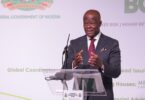In 2023, Nigeria’s President Bola Tinubu introduced significant economic reforms, including the removal of fuel subsidies and the liberalization of the forex market.
While these moves aimed to strengthen Nigeria’s economy, their impact varied across sectors.
The banking industry, benefiting from the forex market liberalization, saw a surge in foreign exchange asset values, boosting profits.
In contrast, sectors like agriculture and manufacturing faced rising inflation and borrowing costs. Given the banking sector’s windfall gains, a windfall tax on banks is seen as a justified measure to restore economic balance, allowing the government to capture profits driven by policy changes rather than innovation or increased productivity.
The concept of a windfall tax is straightforward: when certain sectors or companies profit disproportionately from external factors—such as government policies or global market shifts—it is reasonable for them to contribute more to public funds. In Nigeria’s case, banks’ windfall profits primarily stemmed from the government’s liberalization of the exchange rate, resulting in substantial revaluation gains on their foreign exchange holdings.
Nigeria’s windfall tax on banks is neither unprecedented nor unique. Globally, governments have increasingly imposed similar taxes on sectors that have reaped extraordinary profits due to external shocks or policy changes. For example, European nations recently levied windfall taxes on energy companies that posted record profits due to soaring energy prices, driven largely by sanctions related to the war in Ukraine. Additionally, more subtle windfall taxes, such as those on inheritance and lottery winnings, are tools to balance fiscal responsibility with social equity, ensuring that those benefiting disproportionately from market or policy shifts contribute back to society.
In each of these instances, windfall taxes were introduced to address market distortions and redistribute gains that were not driven by sector-wide improvements or efficiencies, but by external shifts. Nigeria’s situation with its banks is similar. The liberalization of the foreign exchange market led to a sharp revaluation of the banks’ forex holdings, generating windfall profits. The logic at the sector level is straightforward: when a sector disproportionately benefits from external factors, it should help mitigate the broader societal impact of those factors.
The tax in question will only apply to realised gains, which are the gains that banks have actually earned, rather than just their paper profits. To illustrate, if a bank gave out a loan in FX when the Naira was around N435/$, and the debtor is now repaying it at N1600/$, the realised gains would be the difference between loan repayments made at the initial exchange rate and repayments made at the new exchange rate.
The focus on banks is not random. There is a direct connection between the profits of the banks, the devaluation of the exchange rate, and the challenges of the real sector. For every loan asset that suddenly appreciated in value for banks, a corresponding liability increased for other private sector players within the economy, who have taken such loans, with much of this burden falling on key industries such as manufacturing and agriculture. Additionally, given the concentration of FX loans among the organized private sector, this rapid wealth redistribution occurred not just from citizens to the wealthy but specifically from the productive sectors of the economy to the financial sector, which, in a healthy economy, serves primarily as a conduit for capital.
Nigeria’s government is contending with a substantial fiscal deficit, worsened by stagnating oil revenues and rapidly rising debt levels. The removal of fuel subsidies and the liberalization of the foreign exchange market were intended to tackle these fiscal challenges, but they have also introduced additional social and economic pressures. The government’s revenue base is failing to keep pace with its spending demands, especially as it seeks to shield the poorest Nigerians from the impact of these reforms.
The windfall tax offers a fair solution by targeting the sector that has most benefited from recent policy changes. These gains are redirected to fund government efforts to ease the burden on other vulnerable sectors, both directly and by relieving fiscal pressure. It’s not about penalizing banks for profits, but ensuring a more equitable distribution of policy benefits.
A windfall tax on banks is one of the fairest methods to raise critical revenue. Unlike taxes on goods and services, which disproportionately impact the poor, it targets largely earned profits resulting from policy implementations, providing the government with income without adding burdens to ordinary Nigerians.
The banking sector, due to its central role in the economy, has historically benefited as a financial intermediary. During economic downturns, banks access foreign exchange and credit more readily than average citizens or small businesses. Forex market liberalization amplified these advantages, creating extraordinary gains and further widening the gap between the financial sector and the real economy.
The windfall tax ensures that the sector benefiting most from recent reforms contributes fairly to addressing the broader social and economic impacts. It promotes fairness, responsibility, and more equitable distribution of policy benefits. Importantly, banks also have a vested interest in the success of forex market reforms, preventing a return to opaque, restrictive capital controls.
The windfall tax on Nigeria’s banks is not punitive but a pragmatic response to the economic imbalance caused by forex market liberalization. While banks have reaped extraordinary profits from this one-time policy shift, the broader economy, especially vulnerable sectors, has faced significant challenges and struggles.
By taxing windfall profits, the government addresses its fiscal challenges and growing inequality in Nigeria. This tax enables critical public investments in critical sectors of the economy, as well as enabling the provision for social programs, helping to alleviate the impact of reforms on ordinary citizens. Globally, Nigeria follows a well-established practice of using windfall taxes to ensure those benefiting disproportionately from policy implementation shifts contribute more proportionately to the economy.
At its core, the windfall tax is designed to promote fairness, fiscal responsibility, and social equity—principles that every nation should uphold during periods of economic transition.







